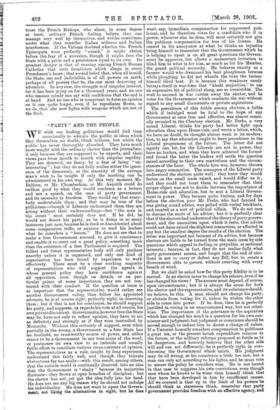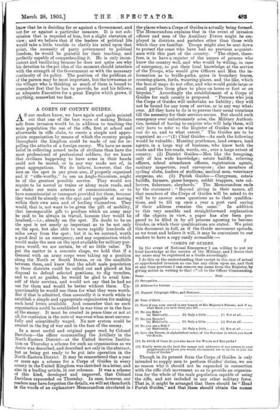" PARTY " AND THE PEOPLE.
WE wish our leading politicians would find time occasionally to educate the public in ideas which they themselves, no doubt, think truisms, but which the public has never thoroughly absorbed. They have much more weight with the ordinary elector than the journalists, if only because they are supposed to be experts, and their views pass from mouth to mouth with singular rapidity. They are deterred, we fancy, by a fear of being " un- interesting " ' • but they do not fully realise either the ignor- ance of the democracy, or the sincerity of the average man's wish to be taught if only the teaching can be administered in his own way. At this very moment Mr. Balfour, or Mr. Chamberlain, or Mr. Asquith could do endless good by what they would condemn as a lecture and not a speech, on the uses of party government and its necessity to freedom. They would say that every- body understands them ; and that may be true of the politicians—though if Liberals understand them they are acting without their understandings—but " the man in the street " most certainly does not. If he did, he would not desert his party, as he is doing in so many instances just now, because he is tired or discontented about some comparative trifle, or anxious to read his leaders what he considers a " lesson." He does not see that to make a free Government succeed, to give it consistency and enable it to carry out a great policy, something more than the existence of a free Parliament is required. The fullest and freest representative body will only produce anarchy unless it is organised, and only one kind of organisation has been found by experience to work effectively. There must be a clear working majority of representatives who will support the agents in whose general policy they have confidence against all opposition, even though on details, or on par- ticular points of some importance, they are not con- tented with their conduct. If the question at issue is so important that the representative would rather see another Government ruling than follow his appointed advisers, he is of course right, perfectly right, in deserting them ; but if that is not his conclusion, he should support his party, and suppress, as regards his vote at all events, his own private discontent. Governments, however free the State may be, have not only to reflect opinion, they have to act as definitely and strongly as if they were controlled by Monarchs. Without this certainty of support, even when partially in the wrong, a Government in a free State has no foothold, no trustworthy source of power, and either ceases to be a Government in any true sense of the word, or postpones its own view to an imbecile and usually futile effort to conciliate various cross-currents of opinion. The representatives as a rule, taught by long experience, understand this fairly well, and though they tolerate abstentions far too easily—with this result, among others, that the outside world is continually deceived into an idea that the Government is " shaky " because its majorities fluctuate—they frown at open breaches of discipline ; but the elector has not,yet got the idea fully into his head. He does not see any big reason why he should not indulge his individuality. He does not want to upset the Govern- ment, not liking the alternatives in sight, but he does want, say, immediate compensation for suppressed pub- licans, and he therefore votes for a candidate who if in power, whatever else he does, will most certainly not give the publican compensation for loss of his license. He cannot in his annoyance at what he thinks an injustice bring himself to remember that the Government which he is helping to upset is on all great questions the Govern- ment he approves, but allows a momentary irritation to blind him to what is for him, as much as for his Member, the grand political necessity. He behaves exactly as a farmer would who dismissed his best ploughman because while ploughing he did not whistle the tune the farmer himself liked best. It is because this weakness rarely betrays itself in war-time that " khaki majorities," to use an expressive bit of political slang, are so irresistible. The wish to succeed in war carries away the elector, and he votes for the Government which conducts the war without regard to any small discontents or private aspirations.
The prevalence of this foible among electors, a foible which if indulged must be fatal to the hope of any Government at once free and effective, was almost comic- ally revealed in the Chertsey election. Mr. Perks, a very sound Liberal, thinks his party had better fight upon education than upon Home-rule, and wrote a letter, which, we have no doubt, he thought almost weak in its modera- tion, to say that education ought to have precedence in the Liberal programme of the future. The letter did not signify one bit, for the Liberals are not in power, they have no leaders, and when they have achieved the former and found the latter the leaders will settle the question raised according to their own convictions and the circum- stances of the hour. The whole hive was, however, thrown into angry commotion. The managers of the Liberal party understood the electors quite well ; they knew they would. fasten on the small issue raised, and would differ on it ; and they could not trust them to remember that their proper object was not to decide between the importance of Home-rule and education, but to seat a Liberal Govern- ment in power. They became quite furious, and for days before the election poor Mr. Perks, who had fancied he was giving sound advice, was pelted with verbal brickbats, and treated as a sort of political villain. We do not care to discuss the merit of his advice; but it is perfectly clear that if the electors had understood the theory of party govern- ment, and the necessities upon which it rests, that advice could not have raised the slightest commotion, or affected in any but the smallest degree the results of the election. The letter was important not because of its advice, but because electors are liable to be turned from the main issue by side questions which appeal to feeling, or prejudice, or sectional interests ; because, in fact, they do not realise fully what party government means, and forget that the end of elec- tions is not to carry or defeat any Bill, but to create a Government able to govern without swerving with every breath of wind.
But we shall be asked how far this party fidelity is to be carried. Is an elector never to change his colours, even if he has changed his views ? The answer must depend, of course, upon circumstances ; but it is always the same for both the elector and the representative, and its substance should, we believe, be this. A man should not change his party, or abstain from voting for it, unless he wishes the other side to come into power. If he does, then he is perfectly justified in voting in an unaccustomed way, but not other- wise. The importance of the grievance or the aspiration which has changed his mind is a question for his own con- science and judgment, but judgment or conscience Ei hould be moved enough to induce him to desire a change of rulers. If a Unionist honestly considers compensation to publicans a great sin, or the present lavish expenditure ruinous to the future, or the military reforms proposed so futile as to be dangerous, and honestly believes that the other side will and can act differently, he is perfectly right in over- throwing the Government which exists. His judgment may be all wrong, or his conscience a little too raw, but a man can only act according to his lights, and he must vote to secure the policy he considers wise. He is not bound in that case to suppress his own convictions, even though men whom he knows to be wiser than himself think that they have been developed in him by insufficient causes. All we contend is that up to the limit of his powers he should think as statesmen think, remember that party government provides freedom with an effective agency, and know that he is deciding for or against a Government, and not for or against a particular measure. It is not sub- mission that is required of him, but a slight elevation of view; and we believe that if the leaders of political life would take a little trouble to clarify his mind upon that point, the necessity of party government to political. freedom, he would be grateful for their teaching, and perfectly capable of comprehending it. He is only incon- sistent and vacillating because be does not quite see why his devotion to the pet idea of the moment should interfere with the strength of the Government or with the necessary continuity of its policy. The position of the publican or of the parson may be most important, but the townsman or the villager who is thinling so much of them is bound to remember first that he has to provide, he and his fellows, an adequate Executive for a great Empire which grows, if anything, somewhat too fast.











































 Previous page
Previous page